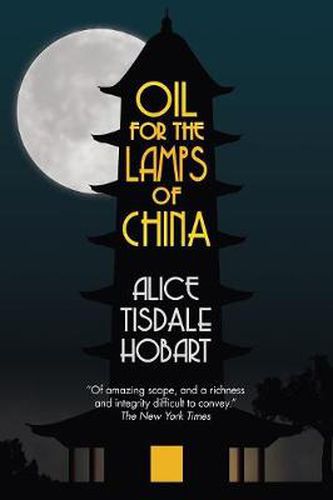Readings Newsletter
Become a Readings Member to make your shopping experience even easier.
Sign in or sign up for free!
You’re not far away from qualifying for FREE standard shipping within Australia
You’ve qualified for FREE standard shipping within Australia
The cart is loading…






This title is printed to order. This book may have been self-published. If so, we cannot guarantee the quality of the content. In the main most books will have gone through the editing process however some may not. We therefore suggest that you be aware of this before ordering this book. If in doubt check either the author or publisher’s details as we are unable to accept any returns unless they are faulty. Please contact us if you have any questions.
Oil for the Lamps of China (1934) was a best-selling novel when it was first published, just a few years after Pearl Buck’s The Good Earth (1931). The hero of the story is a keen, young American businessman who wants to bring light and progress to China in the form of oil and oil lamps, but who is caught between Chinese revolutionary nationalism in the 1920s and the heartless American corporation that has built his career.
The title became a catch phrase for expansive American dreams of the vast China market even though the novel itself, written at the beginning of the Great Depression, was skeptical of large business and any supposed American ability to improve China.
The author presents a clear portrait of Western idealism versus Eastern pragmatism in the doubly exotic setting of Mainland China before the advent of large-scale industrialization. The portrayal is unflattering to both sides.
While some might now regard the more sympathetic treatment of the young American as out of date, others would counter that the picture is both historically and contextually accurate. Now, nearly seventy years since it was originally published, … Oil for the Lamps of China again seems timely. Once again ambitious young Americans like Stephen Chase are working for big corporations in China… . Once again sensitive young spouses like Hester are coping with the rigors of living simultaneously in American corporate culture and Chinese culture… . As these parallels suggest, if Oil for the Lamps of China was timely in the 1930s, then it also seems timely today.
– from the introduction by Sherman Cochran
$9.00 standard shipping within Australia
FREE standard shipping within Australia for orders over $100.00
Express & International shipping calculated at checkout
This title is printed to order. This book may have been self-published. If so, we cannot guarantee the quality of the content. In the main most books will have gone through the editing process however some may not. We therefore suggest that you be aware of this before ordering this book. If in doubt check either the author or publisher’s details as we are unable to accept any returns unless they are faulty. Please contact us if you have any questions.
Oil for the Lamps of China (1934) was a best-selling novel when it was first published, just a few years after Pearl Buck’s The Good Earth (1931). The hero of the story is a keen, young American businessman who wants to bring light and progress to China in the form of oil and oil lamps, but who is caught between Chinese revolutionary nationalism in the 1920s and the heartless American corporation that has built his career.
The title became a catch phrase for expansive American dreams of the vast China market even though the novel itself, written at the beginning of the Great Depression, was skeptical of large business and any supposed American ability to improve China.
The author presents a clear portrait of Western idealism versus Eastern pragmatism in the doubly exotic setting of Mainland China before the advent of large-scale industrialization. The portrayal is unflattering to both sides.
While some might now regard the more sympathetic treatment of the young American as out of date, others would counter that the picture is both historically and contextually accurate. Now, nearly seventy years since it was originally published, … Oil for the Lamps of China again seems timely. Once again ambitious young Americans like Stephen Chase are working for big corporations in China… . Once again sensitive young spouses like Hester are coping with the rigors of living simultaneously in American corporate culture and Chinese culture… . As these parallels suggest, if Oil for the Lamps of China was timely in the 1930s, then it also seems timely today.
– from the introduction by Sherman Cochran